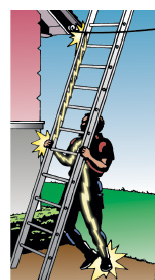| |
| |
CALL

Dig safe
Damage to a natural gas pipeline can cause a gas leak that can result in a fire, explosion and/or injuries.
Call 811 or use the online ticket system at 811express.com at least two working days (not including the date of notification) prior to starting work.
Stay alert and look up
Look up and around before lifting or moving irrigation pipes or ladders. Check for power lines, poles and support wires before driving or operating equipment.
Injury or possible death can result from contact with any overhead or underground power line, large or small.
Even the service wires that run from utility poles to buildings and pumps are potentially dangerous.
Keep yourself and all tools and equipment at least 10 feet away from overhead power lines. Only qualified
line-clearance tree trimmers can work in the 10-foot
safety zone.
Higher voltages require a larger safety zone. Before work begins, your crew leader must brief you about power line voltages in your work area and the clearances required to get the job done safely.
Make the call
If you suspect a gas leak or if you contact a gas pipeline or electric power line, call 911 immediately then PG&E at:
1-800-743-5000.
|
|
|
|
|
Circuits and Conductors
Electricity travels in closed circuits, usually through a conductor. A conductor is a substance with little resistance to the flow of energy. Metal equipment, metal roofs, aluminum ladders and even your body are potential conductors.
 How Do You Get Shocked?
Electrical shock occurs when a person's body contacts an electrical circuit and provides a path for electricity to leave the circuit and travel to the ground. On the job site, this can happen when:
- You contact one wire of an energized circuit and the ground at the same time
- You touch equipment that's in contact with an energized wire while you're also in contact with the ground.
What Happens When You Get Shocked?
 Lower voltages (and lower amperages) can cause muscle spasms that inhibit your ability to "let go" of the object you're touching that's completing the circuit. The degree of injury increases with every second your body is conducting electricity. Lower voltages (and lower amperages) can cause muscle spasms that inhibit your ability to "let go" of the object you're touching that's completing the circuit. The degree of injury increases with every second your body is conducting electricity.
Higher voltages (and higher amperages) can throw you clear and interrupt the circuit. However, injury or death can still result from the electrical shock or fall.
There is a risk of serious injury or death any time you come into contact with an energized circuit, whether low or high voltage. That's why it's important to stay away from all energized conductors, thus avoiding contact with any electricity.
Additional digging guidelines, emergency procedures, case studies, instructional videos and training tools can all be found at no charge to you on the PG&E e-SMARTworkers website. Here you can also order free safety materials for contractors and tree workers.
Did you find this information helpful? We'd like to know. Please reply to this email, and tell us what you think or let us know what topics you'd like to see in future emails.
|
|



 Lower voltages (and lower amperages) can cause muscle spasms that inhibit your ability to "let go" of the object you're touching that's completing the circuit. The degree of injury increases with every second your body is conducting electricity.
Lower voltages (and lower amperages) can cause muscle spasms that inhibit your ability to "let go" of the object you're touching that's completing the circuit. The degree of injury increases with every second your body is conducting electricity.